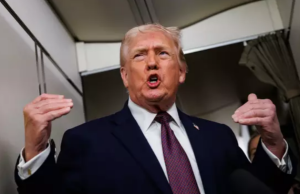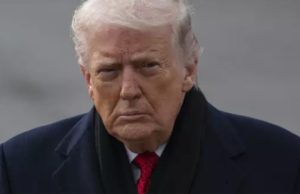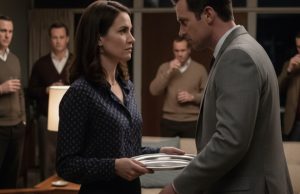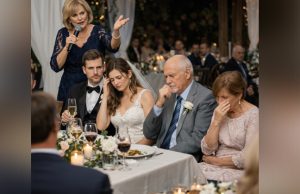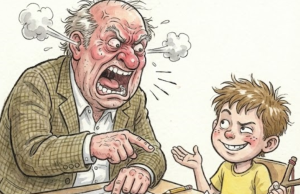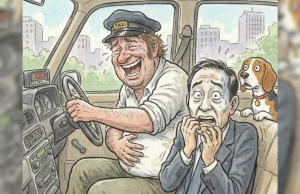
If someone had ever suggested that Alexander Harrington’s life would be turned upside down by a boy with a ripped shirt and a plastic stethoscope, he would’ve scoffed—and thrown in a sarcastic remark for good measure. Yet, that’s precisely how everything started.
Alexander despised parks, especially on Sundays. He loathed this one in particular—the noise, the sugary scent of popcorn in the air, the chaotic flocks of children darting dangerously close to his wheelchair.
Their joy, their energy, their freedom—it all grated on him. He sat alone beneath the wide canopy of a sycamore tree, cloaked in the silence that came not from peace, but from power. Security had politely pushed everyone back twenty meters.
It had been five years since a stroke had robbed him of movement. His left side was useless, and the right wasn’t far off. He could still think, still talk, and—above all—still judge. And he wielded that skill like a surgeon’s scalpel.
“What’s this nonsense supposed to be?” he sneered at a cluster of kids nearby.
“We’re doctors!” chirped a girl with bright pigtails and a toy clipboard. “We’re saving lives!”
“Saving?” he shot back coldly. “Everyone dies eventually. Especially if you treat people as poorly as you dress.”
The laughter faded. A few kids stepped away. One whimpered. But one small boy held his ground. Slender, bare-headed, and serious beyond his years. Around his neck hung a red toy stethoscope, but he gripped it with the focus of a professional.
“Do you want to get better?” the boy asked, meeting Alexander’s eyes.
“You?” Alexander chuckled bitterly. “The world’s finest hospitals can’t help me. You think you can, for a cookie?”
“No,” the boy replied evenly. “For a million dollars. If you walk after I treat you, you pay. If you don’t—nothing.”
Alexander stared at him, curious despite himself. He’d met conmen, zealots, lunatics. But in this boy—Luke, he’d later learn—was something else. A quiet certainty. A calm that didn’t belong to a child.
“And how exactly do you plan to pull that off?”
“You have to trust me,” Luke said. “That’s the rule. Let me do my ritual. Don’t mock it. Don’t stop it. Just… trust.”
Alexander smirked. His bodyguards exchanged puzzled looks. One leaned in to whisper, “Want us to intervene, sir?”
“No. Let him go ahead. Let’s see what kind of scam this is. Then report him for fraud.”
Luke pulled a shoebox from his backpack and opened it. Inside were bits of ribbon, a small stone, and an old photo. He arranged everything carefully on the grass, muttered to himself, and moved his hands in slow, deliberate patterns. Alexander watched him, strangely riveted.
Then Luke gently placed his warm hand on Alexander’s. “It’s done,” he said. “Tomorrow you’ll walk. Don’t forget the million.”
Without flair or flourish, Luke packed up and walked away, vanishing among the trees and crumbling buildings beyond the park.
One of the guards burst out laughing. “Genius. Didn’t even try.”
Alexander chuckled too, but with a lingering sense of disquiet. That night, he returned home in his usual grim mood, lay in his high-tech hospital bed, and eventually drifted off.
Pain woke him. But this pain was new. Different. It felt like… a cramp?
He assumed it was a medication side effect—until he looked down and saw something that hadn’t happened in five years: his right toe moved. Just a twitch. Then again.
He focused. Another flicker of motion. He didn’t believe it. Called his nurse. Then the doctor. Then an entire team.
His hands trembled—not with rage, as they usually did—but from something closer to awe. Hours later, Alexander stood for the first time in half a decade. Leaning heavily on support, but standing.
“This isn’t medically possible,” his neurologist said, baffled. “Your spinal cord was completely severed. This… this defies explanation.”
“It’s not a miracle,” Alexander whispered. “It’s a debt.”
He remembered Luke’s voice. That unnerving steadiness. Tomorrow you’ll stand. He had.
And now he had to find the boy who healed him.
That night, Alexander dreamed of running. Of breaking into a shaky sprint, breathing hard—but not pursued by pain or paralysis. Instead, a small shadow followed him, always just behind, wearing a boy’s face.
When he woke, sunlight poured through the windows with rude confidence, as if it knew today meant something. And unlike the dream, there was no running. Just ten slow, agonizing steps from the bed to a chair. Every inch was a battle—but real.
His entire being hummed with change. No doctor could explain it. The scans showed no dramatic improvement, and the spinal cord injury still existed. But somehow, his nervous system had started to rebuild itself. A process so rare it bordered on myth. They called it spontaneous neuroregeneration. A miracle by another name.
Alexander knew better.
The next day, he returned to the park. No entourage. No wheelchair. Just a plain gray coat and a cane. He sat on the same bench and waited.
“Where’s the boy?” he asked the children playing nearby. “The one with the red stethoscope. Luke.”
They exchanged confused looks. Shook their heads. No one remembered.
Still, Alexander came back daily. Sometimes reporters approached him—the story of his miraculous recovery had begun to spread. But he brushed them off. He wasn’t interested in headlines. He wanted Luke.
One chilly afternoon, as leaves scattered across the pavement, a ragged man in a smoke-scented jacket sat beside him.
“You’re looking for him,” the man said softly.
Alexander narrowed his eyes. “Luke. You know where he is?”
“I’ve seen him. He helped someone. Just like you. Last time I heard, he was near an old school on the outskirts of New York. A shelter now, maybe. Leaky roof. Nobody really takes care of it.”
“Address?” Alexander asked.
The man told him. Alexander pulled out money. But the man waved it off. “Not for that. It’s good when people with power go looking for those who help, not just those who can help them.”
The place looked forgotten by time. Graffiti-covered walls, shattered windows, weeds choking the gate. A faded sign read Scheduled for Demolition. But behind it—voices. Laughter. A child’s song.
He stepped through. The air inside smelled of soup and something tender. Life.
Children’s drawings covered every wall. He found her first—an elderly woman in a scarf, face tired but eyes kind.
“I’m looking for a boy. Luke,” he said.
She paused, then nodded. “And you’re Mr. Harrington.” He nodded, speechless.
“He said you’d come.” “Where is he?” “Outside for now. He’ll be back.”
She led him to a wall of photos—before and afters of homes, families, fragments of life.
He stopped cold when he recognized one. His company’s logo.
“These buildings…” he whispered. “Yes,” she said. “Torn down for your project. We were moved out. No notice. No aid. We didn’t protest. We were tired. So we stayed. Luke stayed.”
Every word was precise, surgical, and cut deep. He remembered the meeting. “Just old folks and immigrants,” someone had said. And he hadn’t cared. Until now.
Now, he stood inside the cracked shell of a shelter—saved not by his millions, but by the boy who had nothing.
Then Luke appeared. In the doorway. Quiet. Steady. His eyes too serious for someone his age.
“I knew you’d come,” he said.
“Why did you do it?” Alexander asked, his voice raspy.
“Because you were alone,” the boy answered. “And one person isn’t a sentence. Sometimes… one person is a miracle.”
Alexander didn’t mention the million-dollar check. Didn’t speak of promises.
He just stepped closer and said quietly, “Now it’s your turn.”
He had always believed he knew the value of everything—money, labor, people.
But that night, walking the dim corridors of the crumbling school with a bowl of soup in his hands, he realized—he had never known the true cost of shame.
At first, he simply showed up. Sat quietly in the corner. Observed.
He’d bring food some days, medicine on others. Sometimes he just sat.
No one forced him out, but no one welcomed him either. He was respected—but at a distance. Too polished, too upright. A stranger.
He felt it in every glance: they were watching. And not yet trusting. He didn’t protest. He accepted it.
The first time he mopped the floor, he felt every flaw in it. Real, coarse flooring—streaked paint, caked stains. His legs trembled. His arms ached. He said nothing.
Luke passed him the rag in silence. And kept watching.
Everything shifted one rainy night. Water leaked from the ceiling, dripping onto a child’s mattress. Mary, Luke’s grandmother, tried covering the spot with a thin blanket.
Without hesitation, Alexander took off his cashmere coat, climbed onto the sill, and braced a board against the leak.
“You’ll fall,” she murmured.
“I already have. There’s nowhere lower,” he said.
When he stepped down—barefoot, soaked, hands filthy—the kids didn’t just laugh near him. They laughed with him.
That night, he slept on an old mattress in the hallway. No pillow. No buttoned mattress cover. Just a blanket. And silence.
In the morning, Mary brought him tea. No words. Just a cup. Then she walked away. He understood. He belonged now.
Luke didn’t celebrate. Didn’t hug him. Just nodded. Accepted.
“You always looked down on us,” Alexander once said.
“And what would that change?” Luke shrugged. “It wouldn’t bring back our house. Or Grandpa. Or our neighbors.”
“I wanted you to see it.” And he had.
Alexander now saw more than debris—he saw the aftermath. Statistics used to be numbers on a page. “Thirty-two homes demolished” sounded like logistics, not heartbreak. Now those homes were real people—sleeping in hallways, wearing ripped shoes, teaching children to read in broken classrooms.
Each evening, Alexander brought something: warm clothes, a generator, work gloves, flashlights. No assistants. No photos. Just him.
The more he gave, the more he understood—this wasn’t charity. It was redemption.
One night, Luke asked, “Why not just buy everything again? Like before?”
“Because before, I built with paper. Now, I use my hands. And only now do I understand the true worth of a brick.”
Luke studied him. “There’s something different in your eyes.”
“What?”
“Life.”
That night, they played cards. Alexander lost. But laughed. A genuine laugh—his first in years.
The next day, he returned with a blueprint.
“What is it?” Mary asked.
“A plan. I want to rebuild the houses. Two near the park. Then the school. Then the neighborhood.”
“No skyscrapers. Just homes. For people.”
She looked at him.
“People don’t want palaces. They want the promise of stability. You took that from them. Now you want to give it back?”
“I do,” he said.
He knew—rebuilding wouldn’t erase the past.
But maybe it could make peace with it.
That evening, Luke sat on the windowsill writing. Alexander approached.
“What are you doing?”
“Making a list. Of who needs help. Who’s still out there. Sick. Alone. I want to find them.”
“You’re still just a kid,” Alexander said.
“But not clueless,” Luke replied.
Alexander started his own list.
People he owed. Starting with himself.
Then came a morning of quiet dread. No footsteps. No kitchen sounds. No kettle boiling.
Luke noticed first. Mary hadn’t gotten up.
He knocked on her door. Then entered.
She lay on her side, face pale, breath shallow. Her lips dry. Her skin dull.
“Water,” she whispered.
Luke rushed, hands shaking. She sipped—barely. Then closed her eyes again.
Alexander was in the basement when he heard. His heart seized—not from fear, but something deeper. Love.
“Did you call a doctor?” he asked.
“Probably her kidneys,” someone muttered. “We don’t have a car. Or money.”
“We do,” Alexander said. “Let’s go.”
He drove. Luke held Mary’s hand, whispering, “You’ll be okay. I’ll do for you what I did for him.”
At the hospital, tests confirmed the worst.
“Her left kidney has failed. The right one’s close,” the doctor said. “She needs a transplant. Soon.”
“I’ll pay,” Alexander offered.
“It’s not about money. It’s the donor. Time is short.”
Luke stood frozen. Tears welled, but didn’t fall. He stared at his hands—the ones that once healed.
“Why can’t I help now?” he whispered.
Alexander sat beside him. “Because you’re not a god, Luke. You’re a boy. You gave me hope. But this is flesh. Blood. Biology.”
Then he added, softly, “Maybe now it’s my turn.”
Tests confirmed he was a match.
“You’re not young,” the doctor warned. “And you’ll only have one kidney. It’s risky.”
“I’m sure,” he replied.
Before signing, Luke asked, “Why are you doing this?”
Alexander looked him in the eyes.
“So you don’t lose what I lost—someone who loves you. No matter what. Without expectations.”
“This isn’t about repayment. It’s about what really matters.”
The surgery went well.
Mary woke, smiled at Luke, kissed his palms.
“I knew you were close,” she whispered.
He didn’t tell her it wasn’t him who saved her. She already knew.
Alexander, weak but at peace, rested with his eyes closed. Luke brought him an envelope.
“What’s this?”
“A check. A million dollars. You gave it to me. I’m tearing it up.”
He ripped it in half. Tossed it.
“Why?”
“Because you can’t buy real acts. For what you did—you don’t pay. You thank.”
Alexander smiled—for real.
There would be pain ahead. But now he had purpose.
Three months after leaving the hospital, he dug trenches for water pipes himself.
A nurse called out, “Careful! Don’t overdo it.”
“I already gave a kidney,” he laughed. “My arms will manage.”
Thinner, slower, gray. But every step carried weight. Direction.
The old school was transforming. His dream—The Mary Institute—was rising.
A safe haven. A school. Not just for learning, but for hope.
He worked like everyone else. Carried supplies, painted walls, fixed lights.
He wasn’t “the boss.” He was Uncle Alexander.
Candies. Jokes. Stories. Presence.
“Were you really a billionaire?” a boy asked.
“Was,” he smiled. “Now I’m something better. A person.”
He sold the mansion. Bought a modest apartment nearby. Cooked, cleaned, lived simply.
Luke had grown. Glasses, notebooks, ambition. Studying for medical school—paid by Alexander.
At the opening ceremony of the Institute, Luke stood on stage. The crowd waited.
“I once pretended to be a doctor,” he began. “And told someone I could heal him. I didn’t know if I could. But I believed.”
He scanned the faces.
“And he healed me. Not my body. But through actions.”
He spoke of redemption—not bought, but built.
“With hands. With choices. With love.”
“I want to help others, the way I was helped.”
In the front row, Alexander sat in simple clothes. Tears in his eyes. Luke stepped down and hugged him.
“You’ll always be the one who saved me,” he whispered.
They didn’t speak more. They didn’t have to.
And finally, the same park. Alexander sat beneath the sycamore. Children played doctor nearby. Luke watched over them.
A little girl ran up.
“Uncle Alexander, have you been to the doctor?”
He smiled. “Yes. The best one.”
“Who?”
“The one who healed not the body—but the soul.”
He closed his eyes, inhaled summer.Laughter. Wind. Warmth.
Once, he had everything. Now, he had what mattered.
Legacy isn’t in your bank account. It’s in the love you leave behind. In those who carry your light forward.

